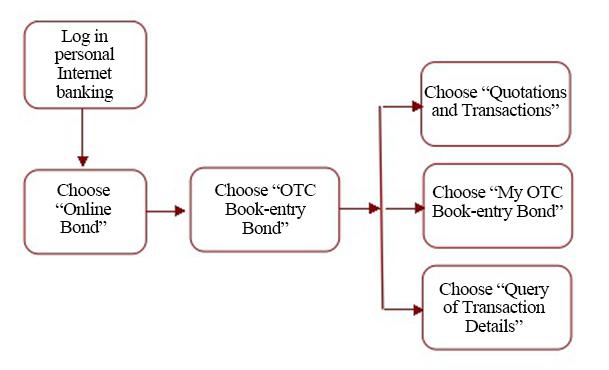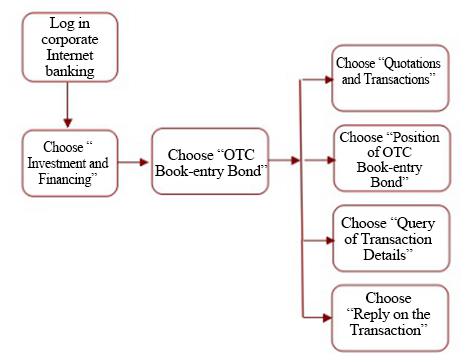I. Description
OTC book-entry bond ("OTC bond") trading service is a book-entry bond investment and trading product provided at ICBC domestic outlets or via e-banking.
OTC Bonds are book-entry bonds tradable at commercial banks with the approval of the People's Bank of China, and under custody of China Central Depository & Clearing Co., Ltd. and Interbank Market Clearing House Co., Ltd. . Customers are not required to hold the certificate, but only open a custody account at the bond custody institution to record the holding. At present, the trading varieties mainly include book-entry treasury bonds, China Development Bank bonds, policy bank bonds, and the bonds of government backed agencies such as China Railway Corporation (the details are subject to the varieties actually offered by the ICBC).
The trading varieties can be divided into continuous trading products and non-continuous trading products based on whether continuous trading is allowed. Continuous trading refers to that, within a calender week except for public holidays, the trading activities can continue during the trading hours starting from the designated start time in the first working day of the calender week to the designated ending time in the last working day of the week. Please refer to the announcements under “New Products” at the Bond channel of the official website (http://big5.icbc.com.cn) for the details of bonds allowed for continuous trading.
Further information on the bond category, issuance size and offering period will be announced by the People's Bank of China and Ministry of Finance through related media.
II. Target Customers
The product is applicable to personal customers with full capacity for civil acts both at home and abroad, and as well as for corporate customers (other than financial institutions) such as enterprises and institutions, state organs and social groups established in the territory of the People’s Republic of China.
III. Price
The ICBC quotes to the customers by taking the price trend of interbank bond market, market liquidity and trading positions into full consideration, and has the right to adjust the trading quotations at any time according to actual market situations. OTC book-entry bonds are traded at net price and squared at full price.
IV. Features and Advantages
i. Features
1. High security: so far, all OTC book-entry bonds are bonds with sovereign credit rating or quasi-sovereign credit rating, involving low credit risk.
2. Good returns: stable interest income can be obtained upon maturity; and spread income can be obtained by seizing favorable opportunities brought by market price fluctuations.
3. Solid liquidity: customers can buy or sell the bonds at any time during the trading session, and real-time clearing of funds can be realized to meet customers’ demand for liquidity.
4. Low threshold: both the threshold for a single transaction and the minimal increment unit are RMB100 in face value.
ii. ICBC’s strength
1. Rich variety of bonds: Book-entry treasury bonds of all key terms are covered. The ICBC is the first to issue China Development Bank Bond and China Export-Import Bank bond.
2. Competitive price: Supported by ICBC’s professional and experienced team, the bank can provide competitive prices to customers.
3. Long trading hours: The ICBC has exclusively introduced the OTC continuous trading service, by which all bonds are sold around the clock during the offering period, and products of continuous trading can be traded around the clock during the trading period.
4. Broad service channels: The ICBC provides account opening and transaction services to customers via multiple channels such as e-banking (including Internet banking and mobile banking) and counters, through which the procedure is simple, fast and efficient.
5. Value-added services: SMS reminders on payment of bond interest and change of trading date etc, are provided; and you may apply for pledge loans by pledging your bonds.
V. Qualification
Personal customers can log in the Internet banking or mobile banking to sign up for the business, or at ICBC outlets with valid identity documents such as ID card (in the case that an agent is assigned for signing up for the business, the valid ID documents of both the applicant and the agent shall be provided).
Corporate customers shall provide valid certification documents such as organization code certificate and the handlers’ valid identity documents as well in order to open the business at ICBC business outlets.
VI. Application Process
Customers can log in the Internet banking or mobile banking, or go to ICBC business outlets to read through the Description of ICBC OTC Book-Entry Bond Products, undertake to abide by the Rules of ICBC for OTC Book-Entry Bond Transactions and sign the Protocol of ICBC for OTC Book-Entry Bond Transactions. After a customer has assigned the capital account for bond trading and paid the account fee for OTC book-entry bond, the ICBC will open a custody account of OTC book-entry bond for the business.
VII. Service Channels and Business Hours
i. Account-opening time
E-banking channels: 0:00-24:00 from Monday to Sunday (applicable for personal customers).
Outlets: the actual business hours (applicable for both personal customers and non-financial institutional customers).
ii. Trading hours
Trading hours of e-banking channels (applicable for subscription of issued bonds, subscription of rolled-over bonds, spot bond trading and bond custody transfer):
1. Subscription of issued/rolled-over bonds
From 10:00 on the start date to 16:30 on the closing date for bond issuance/rolling-over.
2. Spot bond trading/bond custody transfer
(1) Continuous trading products
Monday: 10:00-24:00;
Tuesday to Thursday: 00:00-24:00;
Friday: 00:00-16:30.
(2) Non-continuous trading products
Monday to Friday: 10:00-16:30.
Trading hours of business outlets: Monday to Friday: 10:00-16:30 (applicable for subscription of issued bonds, subscription of rolled-over bonds, spot bond trading, bond custody transfer, and non-transaction transfer of bonds).
In case of public holidays, actual rest days as adjusted based on national regulations, trading suspending days as specified by regulators or owing to unforeseeable, unavoidable and insurmountable force majeure such as natural calamities and war, or under the effect of various international political, economic or emergent factors, or emergencies such as communications failure, system failure, power outages or trading suspension, or the factors such as financial crisis and changes of national policies, the ICBC can suspend the trading of OTC book-entry bonds, and, where feasible, notify customers in advance or in time, insofar as possible, via the channels such as the official website (http://big5.icbc.com.cn).
The customers can submit the applications for subscription of issued bonds, subscription of rolled-over bonds or spot bond trading via e-banking channels or business outlets, and fill in corresponding electronic instructions or vouchers as required, so that the e-bank or business outlets can take actions accordingly.
VIII. Operation Guide
i. Personal Internet banking and mobile banking

ii. Corporate Internet banking

iii. Over the counter
After a customer has opened a bond custody account at the counter, he shall take his valid ID documents, personal debit card or corporate settlement account to an outlet designated by the Bank, and fill in a Bond Transaction Voucher to carry out bond trading, bond custody transfer or other related businesses.
IX. Tips
OTC book-entry bonds can provide stable interest income to investors. For asset allocation-oriented customers hoping to obtain stable interest income from holding the bonds till maturity, they can subscribe bonds during the bond issuance or rolling-over period, or buy bonds at the buying price for customers declared by the ICBC after the bonds have been listed for transactions, and hold them until obtaining the interest income upon maturity.
The price of OTC book-entry bond is closely related to the changes in bond market. For transaction-oriented customers with certain investment experiences and risk-bearing capacity, on the premise of making accurate judgment, they can earn extra spread income by trading OTC book-entry bonds. The bond price is in inverse proportion to the market interest rates, suggesting that the lower the interest rates are, the higher the bond price will be, and when the interest rates rise, the bond price will fall. Therefore, when the economy is developing rapidly and signs of inflation appear and market participants predict that interest rates will rise, customers can sell the bonds they hold to avoid financial losses caused by decline of bond prices following the rise in interest rates. When the interest rates do rise and result in the fall of bond prices, customers can buy in the bonds and wait for profit-taking opportunities. If signs of recession appear and customers buy in the bonds as they estimate that interest rates will fall, they can get profits considerably higher than interest income by selling them when the interest rates actually fall and cause the rise of bond prices.
X. Market Information
Customers can obtain market information related to OTC book-entry bonds through multiple channels such as bank counters of business outlets designated by the ICBC, ICBC’s official website (http://big5.icbc.com.cn), telephone banking (95588) and China bond information network (www.chinabond.com.cn).
XI. Risk Prompt
The trading of OTC book-entry bonds may meet various risks, including policy risk, credit risk, market risk, liquidity risk, operating risk, force majeure and emergency risk. Under the effect of various political and economic factors and emergencies both at home and abroad, the prices of OTC book-entry bonds may swing at every moment. Customers should be fully aware of the risks possibly involved in the business, and volunteer to undertake the risks caused by price fluctuation.
Note: The information provided on this page is for reference only. Concrete business shall be subject to the announcement and provisions of the local outlet.
|





